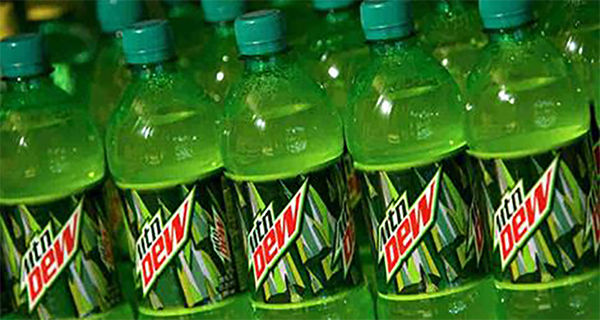Immagina un prodotto alimentare di consumo con un'immagine tagliente che cerca di chiamare il bluff degli attivisti anti-biotecnologie.
What if Mountain Dew advertised not just cleverly-named flavors on its colorful cans–Baja Blast, Code Red, LiveWire, Voltage, eccetera.–but also that its drinks are “powered by biotechnology”?
They already are, infatti. One of the chief ingredients of Mountain Dew is high-fructose corn syrup. That’s a fancy way of saying “sugar derived from corn.”
Because the vast majority of corn and soybeans harvested in the United States are genetically modified, Americans put biotech food into their bellies every day. If they aren’t sipping it in their sodas, they’re chewing chips made with it or enjoying meat that comes from livestock raised on it.
Most of the products stocked on America’s grocery-store shelves can make a plausible claim that they’re “powered by biotechnology.”
So perhaps they should, if only to show up the professional protestors who want to slap warning labels on every food item that relies on modern methods of agricultural production. These activists seem to think that Americans don’t know what they’re eating–and that they’d recoil in horror if they realized that farmers use genetically improved technologies on a daily basis.
But the more important thing is to show American consumers the respect they deserve. While it’s almost certainly true that most Americans couldn’t explain the finer points of recombinant DNA, they do trust their food. They know it’s safe and abundant and that it comes from farmers who put what they grow on their own dinner tables.
Do we really think consumers won’t rearrange their dietary habits if food companies are fully candid on the label about biotech? It’s what we don’t know that worries us most. Does such a label reveal something scary or remove a reason to wonder?
Yet the anti-technology idealists who hate biotechnology believe that mandatory labels are a smart political strategy–and they’re trying to put the issue in front of voters. They want to cast the resistance to labeling in a sinister way.
They’ve turned to politics out of desperation as a “Plan B”, having lost at the regulatory level. The Food and Drug Administration has refused to require the labels they crave, for the perfectly good reason that GM foods pose no special concern to consumers. From the standpoint of human health, they’re the same as foods that don’t include GM ingredients.
The FDA is hardly alone in reaching this conclusion. It’s joined by the American Dietetic Association, the American Medical Association, the Research Council of the National Academies of Science, and the United Nations Food & Agriculture Organization. They’ve all studied biotech foods and have determined that they’re perfectly safe for people to eat.
In California, activists are hoping voters will reach a different conclusion–o, to put it more precisely, they’re hoping they can persuade voters to arrive at a different conclusion. They intend to put an initiative on the November ballot. If it qualifies and voters approve it, the state would require food labels to announce the presence of GMO ingredients.
If this happens, details will matter. A mandatory label could require a simple line, such as “This product may contain GM ingredients.” Or it could demand a biohazard symbol, which of course would be absurd.
What the activists really want is a national policy–a federal requirement to label GM food–and most likely they want it to look like a warning label.
They’re attracting high-powered allies. Solo il mese scorso, Gary Hirshberg, the CEO of the organic yogurt company Stonyfield, announced that he’s stepping down from his job and will spend his time pushing for the mandatory labeling of GM foods.
A lot of the money for these efforts in California and at the federal level will come from the organic-food industry, which believes it can achieve a market advantage if non-organic products have to wear a label that will raise unnecessary questions in the mind of consumers.
How about we all stop playing these silly games and contributing to the confusion and potential mistrust of consumers for technical progress on food safety and quality. Consider labeling, control the details and move ahead proudly on behalf of our customers.
Reg Clause owns a 4esimo generation family farm near his home in Jefferson, Iowa. His next generation grows corn, soybeans and cattle and the 6esimo generation is there too. Reg volunteers as a board member for Truth About Trade & Tecnologia.


